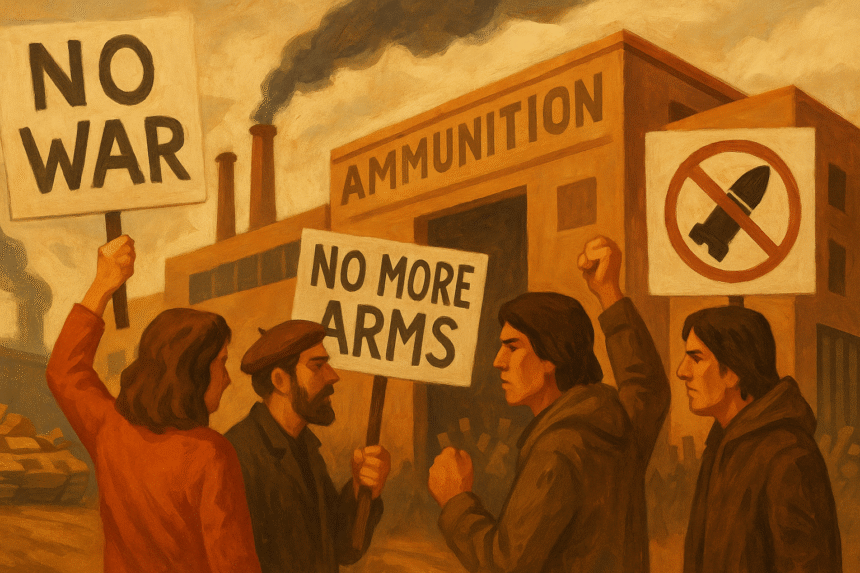Europe’s ambition to expand ammunition production amid the ongoing war in Ukraine has met unexpected resistance in Italy, where local pacifist and environmental groups are blocking the expansion of a key explosives plant operated by Germany’s Rheinmetall.
Dispute Over the Sardinia Plant
At the heart of the controversy is Rheinmetall’s subsidiary RWM Italia, which operates a munitions facility in Domusnovas, Sardinia. The company has been waiting six months for approval from Sardinia’s regional authorities to activate new production lines that would significantly increase output.
Although Italian government technical experts deemed the expansion environmentally safe in April, the regional council—controlled by the Five Star Movement (M5S)—has refused to grant approval, demanding further documentation. The council’s president, Alessandra Todde, questioned the broader implications of the project, stating, “What we need to ask ourselves is: Do we want to be in a war economy?”
Her comments echo the position of Giuseppe Conte, national leader of M5S, who has criticized Europe’s defense buildup, accusing governments of enriching arms manufacturers like Rheinmetall at the expense of social investment.
Ideological Clash and Bureaucratic Delays
The standoff underscores how Italy’s strong pacifist and environmental traditions are complicating Europe’s rearmament efforts. Despite being one of the continent’s major industrial economies, Italy faces recurring bureaucratic hurdles that slow defense-related projects.
“Local authorities or political parties that oppose defense production—whether for ideological reasons, environmental concerns, or political motives—have significant leverage,” said Alessandro Marrone, a defense analyst at the Rome-based Institute of International Affairs.
Lawmakers from Prime Minister Giorgia Meloni’s right-wing Brothers of Italy party have accused the Sardinian council of political obstruction. “They think, ‘no weapons, no wars.’ But that’s not how it works,” said Antonella Zedda, a Brothers of Italy parliamentarian from Sardinia, describing M5S’s stance as “fake pacifism.”
Rheinmetall’s Case for Expansion
Rheinmetall maintains that the expansion is driven not by profit but by necessity. A 2023 company analysis seen by the Financial Times stated the goal was “to expand production capacity to supply national, European, and allied armed forces with what they need in shorter times and at lower costs.”
The Domusnovas plant, established in 2010 on the site of a former mining explosives factory, produces munitions and underwater mines. In 2018, RWM Italia secured permission to build new production lines and an explosives testing field, planning to hire 250 additional workers. However, environmental and pacifist groups mounted legal challenges, freezing progress for years.
Legal Battles and Environmental Concerns
In 2021, Italy’s Council of State ordered a full environmental impact assessment after activists claimed the project was divided into smaller segments to evade comprehensive scrutiny. While the post-facto assessment was approved by experts earlier this year, the regional council has delayed ratification by seeking reviews from 10 government departments.
Activist Graziano Bullegas accused Rheinmetall of taking a “colonial approach,” claiming the company built facilities without proper authorization. Local groups like the Committee for the Reconversion of RWM have pledged to continue their legal fight, arguing that the plant should be repurposed for civilian use. “You cannot use war to resolve controversies between nations,” said Arnaldo Scarpa, a teacher and committee member.
Economic Stakes for Sardinia
Earlier this month, a court ruled that Sardinia’s regional council must make a decision within 60 days or face the appointment of an independent commissioner. Meanwhile, the dispute has raised concerns about the region’s investment climate.
Zedda warned that prolonged political resistance sends “an alarming message to investors,” particularly as Sardinia struggles with unemployment. “The message is peculiar: you can’t have free enterprise in Sardinia if what you produce doesn’t please the wider community,” she said.
A Symbol of Europe’s Dilemma
The Sardinian impasse encapsulates a broader European dilemma—balancing ethical, environmental, and political ideals with the urgent need to strengthen defense capabilities amid rising security threats. As the war in Ukraine continues and the continent seeks to reduce reliance on U.S. protection, Italy’s pacifist pushback serves as a vivid reminder that not all of Europe is comfortable with rearmament.








